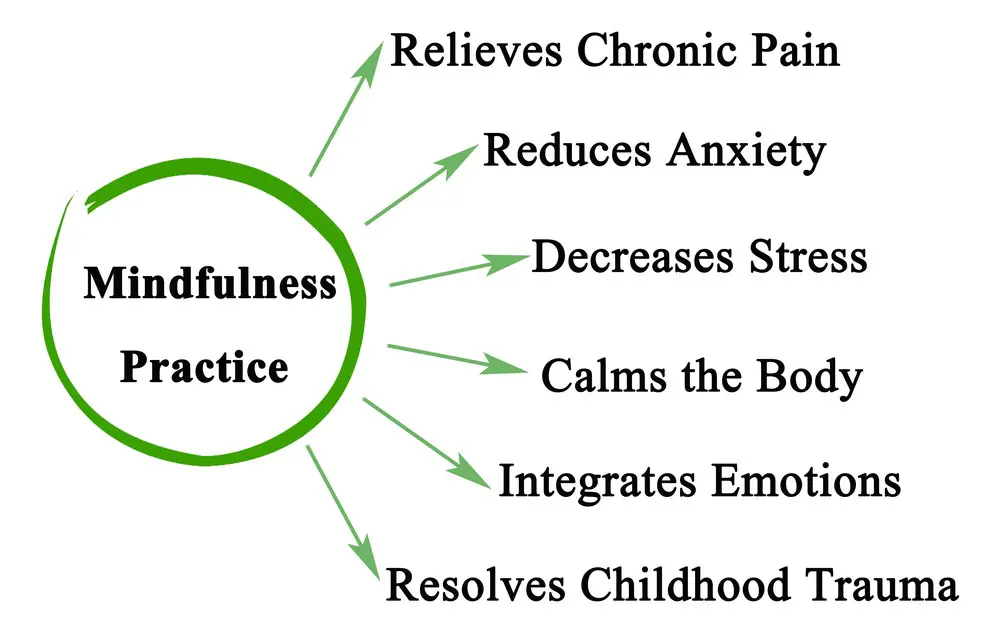As a BetterHelp affiliate, we receive compensation from BetterHelp if you purchase products or services through the links provided
Zen therapy, a holistic approach to mental health and well-being, integrates the ancient wisdom of Zen Buddhism with modern psychological principles. It is an experiential therapy that emphasizes mindfulness, self-awareness, and acceptance. By incorporating meditation, breathing exercises, and other mindfulness practices, Zen therapy aims to provide individuals with the tools to develop a deep sense of inner peace and resilience amidst life’s challenges.
The origins of Zen therapy can be traced back to the teachings of Zen Buddhism, which has been practiced for centuries across many East Asian cultures. In recent years, this approach has gained recognition and interest in the West, as mental health professionals and individuals recognize the therapeutic potential in cultivating psychological and spiritual well-being. Combining traditional Zen practices and contemporary psychotherapy techniques, Zen therapy fosters a profound understanding of the self, ultimately leading to a richer, more fulfilling life.
Key Takeaways
- Zen therapy is a holistic approach that blends ancient Buddhist principles with modern psychological methods.
- The practice encourages mindfulness, self-awareness, and resilience to help individuals cope with life’s challenges.
- Increasing interest in this therapy has led to its incorporation into Western mental health practices for personal growth and well-being.
 Understanding Zen Therapy
Understanding Zen Therapy
Zen therapy is a therapeutic approach that combines the principles of Zen Buddhism with psychological methods to promote mental well-being. It aims to help individuals better understand themselves, cultivate mindfulness, and address psychological challenges.
In Zen therapy, the therapist serves as a guide, assisting the client in navigating the complexities of their emotions, thoughts, and experiences. They encourage the practice of meditation as a way to achieve insight and clarity. Through meditation, individuals can cultivate greater self-awareness, allowing them to identify and address any underlying issues contributing to their psychological distress.
The practice of rituals is another essential aspect of Zen therapy. These rituals can vary but often involve tea ceremonies, walking meditation, or simple mindfulness exercises. Rituals allow the client to immerse themselves in the present moment, fostering an environment of tranquility and focused attention.
At the core of Zen therapy is mindfulness, which encourages individuals to cultivate a nonjudgmental awareness of their thoughts, feelings, and experiences. Practicing mindfulness enables clients to approach their psychological challenges with a more balanced and grounded perspective.
Additionally, Zen therapy aims to integrate the body and mind as one entity, addressing psychological issues holistically. This approach emphasizes a connection between physical and mental well-being, often incorporating yoga or tai chi alongside meditation and ritual.
Zen therapy offers a unique approach to addressing psychological challenges by blending traditional Zen practices with psychological methods. Individuals can cultivate greater self-awareness through meditation, ritual, and mindfulness and achieve lasting mental well-being.
 Origins and Philosophy
Origins and Philosophy
Zen therapy has its foundations in both Buddhism and psychology, combining elements of Zen Buddhism with modern therapeutic practices. Zen Buddhism, a school of thought within Buddhism, emphasizes the practice of meditation as a means to attain enlightenment. In the context of therapy, this translates to using mindfulness and self-awareness techniques to foster emotional healing and personal growth.
One of the core principles of Zen therapy is the idea that an individual’s inherent nature is wholesome, perfect, and unchanging. This belief contrasts with the common assumption in Western psychology that individuals need to change or modify their behaviors to experience well-being. In Zen therapy, the therapist helps clients connect with their true nature by guiding them to observe their thoughts and emotions without judgment.
Within Buddhist psychology, awareness is crucial in promoting change and personal transformation. Zen therapy, too, places a strong emphasis on cultivating mindfulness as a means to facilitate change. By directing their focus on the present moment, clients can gain deeper insights into their emotional patterns and better understand how their thoughts and behaviors are interconnected.
Incorporating aspects of both Buddhism and modern psychology, Zen therapy emphasizes the importance of self-awareness and mindfulness. It empowers individuals to recognize their true nature and experience transformative change by observing their thoughts and emotions without judgment. This unique fusion of ancient wisdom and contemporary therapeutic practices offers a holistic approach to emotional well-being, personal growth, and self-discovery.
Therapeutic Process and Techniques
Zen therapy is a form of psychotherapy that integrates the principles and practices of Zen meditation with traditional therapeutic methods. The primary goal of Zen therapy is to help individuals achieve mental and emotional balance through increased self-awareness, mindfulness, and acceptance.
The therapeutic process typically begins with an assessment, allowing the therapist to understand the client’s background, concerns, and goals. After the assessment, the therapist will guide the client through various techniques to help them cultivate mindfulness and self-awareness. Some common techniques used in Zen therapy include:
- Zen meditation: A central component of Zen therapy, this practice involves sitting in a comfortable position and focusing on the breath, the bodily sensations, or a specific point. The objective is to achieve a state of deep concentration and awareness, which helps the client to gain better control over their thoughts and emotions.
- Art therapy: This therapy involves using creative expression for self-discovery and healing. Clients may be encouraged to create artwork, such as drawings or paintings, to express their emotions and gain insights into their inner selves.
- Transcendental Meditation (TM): While not exclusive to Zen therapy, TM is a form of meditation that can be incorporated into the therapeutic process. This technique involves repeatedly using a mantra, a word or a phrase to help center the mind and achieve a relaxed awareness.
- Experiential therapies: Zen therapy may also involve various experiential activities, such as movement exercises, breathwork, or role-playing, to help clients better understand their emotions and develop coping strategies.
It’s important to note that the techniques used in Zen therapy are not limited to these examples. Therapists may employ other methods, such as Eye Movement Desensitization and Reprocessing (EMDR) or Systematic Desensitization, depending on the client’s unique situation and needs.
While the specific techniques and approaches may vary, the underlying principles of Zen therapy remain consistent. It seeks to cultivate a sense of balance, self-awareness, and acceptance in clients, ultimately promoting mental and emotional well-being.
 Connection Between Zen Therapy and Mental Health
Connection Between Zen Therapy and Mental Health
Zen therapy is known for its positive impact on mental health. It offers individuals effective coping mechanisms for dealing with depression and anxiety. By fostering mindfulness, it promotes emotional well-being and reduces overall suffering.
One key aspect of Zen therapy is its focus on self-awareness. Individuals become more in tune with their thoughts and emotions through meditation and mindfulness exercises. This increased self-awareness can lead to greater resilience in the face of stressors and facilitate better management of mental health issues.
Another notable aspect is the promotion of a nonjudgmental attitude. Participants are encouraged to observe their feelings and emotions without assigning them a value. This attitude can be particularly helpful for individuals dealing with anxiety or depression, as it lessens the impact of negative thoughts and emotions.
Zen therapy techniques can be a powerful tool for stress reduction. By practicing mindfulness exercises and meditation, individuals can cultivate a sense of inner peace that helps them navigate stressful situations more easily. This, in turn, can positively affect their overall mental health and well-being.
Furthermore, implementing Zen therapy principles in daily life can improve emotional regulation. The practice of staying present and mindful allows individuals to manage their emotional responses to stimuli better. This reduction in emotional reactivity can lessen the severity of symptoms associated with anxiety and depression, which ultimately improves mental health.
Zen therapy is a valuable approach to supporting and maintaining mental health. Its practices and principles offer individuals new methods to address depression, anxiety, and general emotional well-being. With stress reduction, self-awareness, and nonjudgmental attitudes as some of its cornerstones, Zen therapy paves the way for a healthier and more balanced mental state.
 Role and Training of a Zen Therapist
Role and Training of a Zen Therapist
Zen therapy is a unique approach to mental health care, emphasizing mindfulness, meditation, and personal growth. The role of a zen therapist encompasses guiding clients to self-discovery through mindfulness practices and exploring spirituality and self-awareness as key components of overall mental health.
A zen therapist’s training often begins with acquiring a graduate-level degree in psychology, counseling, or another field related to mental health care. As part of their education, they may specialize in zen therapy or a related discipline, such as mindfulness-based cognitive therapy. This specialization will provide them with a solid foundation in the theories and practices of Zen therapy, with a particular focus on the clinical applications of mindfulness and meditation.
Therapists must also adhere to the ethical standards and guidelines set forth by professional organizations such as the American Psychological Association. This ensures they provide sound, evidence-based care while maintaining the highest levels of professionalism and confidentiality.
Becoming a skilled zen therapist requires additional training beyond the traditional academic courses. This typically involves:
- Personal practice: Developing a strong personal meditation practice is essential for a Zen therapist. This helps build empathy, self-awareness, and a practical understanding of their clients’ experiences during therapy.
- Supervised practice: Just like other mental health professionals, zen therapists complete supervised clinical hours under the guidance of an experienced practitioner. This allows them to develop their assessment, intervention, and evaluation skills while working with a diverse range of clients.
- Continuing education: To stay up-to-date on the latest research and best practices in the field, zen therapists engage in ongoing professional development by attending workshops, seminars, and conferences focused on mindfulness-based interventions and related topics.
Throughout their training and practice, zen therapist cultivates essential tools for their client’s growth and well-being. By integrating contemporary psychology with ancient wisdom, they provide a unique and holistic approach to mental health care, helping individuals along a path towards increased self-awareness, inner peace, and, ultimately, a more meaningful and fulfilling life.
Zen Therapy and Western Medicine
Zen therapy, rooted in Buddhist principles, is a holistic approach to mental health that incorporates meditation, mindfulness, and self-awareness. It offers a unique perspective on healing that differs from traditional Western medicine practices such as Cognitive Behavioral Therapy (CBT) and psychotherapy.
In Western medicine, CBT focuses on helping the individual identify and change dysfunctional thinking patterns. This cognitive restructuring, combined with behavioral techniques, aims to promote a healthier mental state. Psychotherapy, however, involves a wider range of exploration into an individual’s past experiences, emotions, and thought processes to uncover unresolved conflicts and bring about understanding and healing.
The integration of Zen therapy and traditional Western methods is gaining attention among mental health professionals. The combination can bring new insights and fresh approaches to mental health care, with Zen therapy providing valuable tools for therapists and patients. For instance, mindfulness practices and meditation from Zen therapy can enhance CBT by teaching individuals to regulate their emotions and cultivate a non-judgmental awareness.
Zen therapy and Western medicine are not a competition but a collaboration to offer a more comprehensive and beneficial treatment plan for individuals seeking mental well-being. The two approaches share the goal of promoting mental health, and incorporating elements of both will provide patients with various tools to address their specific needs.
Research supports the potential benefits of Zen therapy as a supplementary treatment to Western medicine. Studies have shown that meditation and mindfulness practices can improve symptoms of depression, anxiety, and stress. By integrating Zen therapy techniques into traditional Western methods, clinicians can broaden their repertoire of therapeutic strategies and tailor their approach to each patient’s unique needs. While more research is needed to establish the efficacy of Zen therapy, there is growing interest in using it alongside conventional treatment methods.
Blending Zen therapy and Western medicine can help create a more holistic and inclusive approach to mental health care. Fusing these different perspectives expands the options for individuals seeking relief from various mental health concerns, ultimately increasing the likelihood of finding lasting resolution and well-being.
Zen Therapy in Everyday Life
Incorporating Zen therapy into everyday life enables individuals to cultivate peace and harmony within themselves and their surroundings. One can foster a deeper understanding of their inner child and sense of self through mindfulness and self-compassion.
Practicing mindfulness at home serves as an effective way to bring focus to the present moment. By allocating a designated space for meditation, individuals can create an environment that promotes tranquility and relaxation. Regular meditation can lead to a heightened awareness of one’s thoughts and emotions, ultimately enhancing their overall quality of life.
In addition to meditation, adopting self-compassion as a daily practice helps nurture the inner child. Treating oneself with kindness and understanding can gradually transform negative self-talk and behaviors into a more loving and supportive mindset. This shift in perspective can significantly improve an individual’s emotional well-being.
Another way to integrate Zen therapy into everyday life is by developing a sense of self through self-reflection and self-awareness exercises. Regularly engaging in these practices allows individuals to explore who they are deeper, ultimately cultivating a strong and resilient sense of identity.
In conclusion, Zen therapy offers numerous benefits when incorporated into daily life. By grounding oneself in the present moment, nurturing self-compassion, and fostering a powerful sense of self, individuals can experience profound improvements in their overall well-being.
Positive Effects and Limitations of Zen Therapy
Zen therapy has garnered attention for its unique approach to mental health, combining elements of spirituality and traditional therapy methods. Through practicing mindfulness and cultivating self-awareness, individuals can experience positive effects such as decreased attachment and reduced susceptibility to psychological illusions.
One of the main benefits of Zen therapy is the enhancement of spirituality for those who partake. As individuals learn to focus on the present moment, they may develop a deeper connection with themselves and the world around them. This increased spiritual awareness can lead to greater inner peace and contentment.
In addition to spirituality, Zen therapy can help individuals overcome attachment issues. By practicing non-attachment, individuals learn to accept impermanence and uncertainty, reducing anxiety and a greater sense of emotional stability.
Reducing psychological illusions is another key aspect of Zen therapy. Through mindful observation, clients can identify cognitive distortions and challenge them effectively. This clarity and insight can lessen the impact of negative thought patterns, ultimately improving mental well-being.
Despite its potential benefits, Zen therapy has limitations. For instance, it may not appeal to those who prefer a more structured, evidence-based approach to therapy. Additionally, working with a qualified practitioner well-versed in Zen practices is important to reap its full benefits, which may be challenging to find in some areas.
Moreover, because Zen therapy emphasizes personal responsibility and self-reflection, it may be less effective for individuals who struggle with severe mental health conditions, such as psychosis or major depressive disorder. In such cases, a more traditional therapeutic approach may be necessary as a complement or alternative to Zen therapy.
In summary, Zen therapy, though beneficial for many, has limitations. While it effectively promotes spirituality, reduces attachment, and minimizes psychological illusions, it may not be suitable for everyone or as a standalone treatment for more serious mental health concerns.
Influential Figures in Zen Therapy
David Brazier is a key figure in the development of Zen Therapy. As the founder of this therapeutic approach, he has dedicated his career to integrating Zen Buddhist principles into therapy. A psychologist, author, and Buddhist teacher, Brazier has worked extensively in the fields of psychotherapy and Buddhism.
Brazier has written several books on Zen Therapy, including Zen Therapy: Transcending the Sorrows of the Human Mind and The Feeling Buddha: A Buddhist Psychology of Character, Adversity, and Passion. These works have contributed to the growing knowledge surrounding Zen Therapy and its applications.
In addition to his written works, David Brazier is the founder of the International Zen Therapy Institute (IZTI). This organization is dedicated to developing, promoting, and researching Zen Therapy as a unique and valuable approach to mental health and well-being.
Through his efforts in creating the IZTI, Brazier has helped nurture a community of therapists and practitioners interested in the integration of Zen and psychotherapy. The IZTI also offers training and certification programs for professionals who wish to incorporate the principles of Zen Therapy into their practice.
While David Brazier is undoubtedly the most influential figure in Zen Therapy, other practitioners and scholars have also made significant contributions. Many therapists and psychologists have drawn inspiration from Brazier’s work and built upon his ideas to develop further and refine the discipline.
In conclusion, the development and growth of Zen Therapy can be attributed to the work of David Brazier and the community he has fostered. His leadership and vision have paved the way for a therapeutic approach combining Zen Buddhism’s wisdom with the practical tools of psychotherapy.
Frequently Asked Questions

What are the core principles of Zen therapy?
Zen therapy is based on the principles of Zen Buddhism, focusing on mindfulness, non-attachment, and compassion. It emphasizes the development of self-awareness through meditation and deep reflection, fostering a non-judgmental and present-centered awareness of thoughts and emotions. The goal is to cultivate inner peace, clarity, and emotional resilience.
How does Zen therapy differ from traditional psychotherapy?
While traditional psychotherapy often focuses on examining and analyzing past events or exploring cognitive patterns, Zen therapy centers on the present moment. It aims to enhance self-awareness, mindfulness, and acceptance. Zen therapy avoids labeling or categorizing mental states, believing such labels may reinforce negative patterns. Additionally, it values the power of personal experience over theoretical models.
What are the key techniques used in Zen therapy?
Some common techniques in Zen therapy include meditation, mindfulness, breathing, and body awareness techniques. Additionally, Zen therapy incorporates compassionate communication and gentle exploration of emotions to cultivate self-understanding and acceptance.
How is Zen therapy applied in mental health treatment?
Zen therapy can be an alternative or complementary approach to traditional mental health treatment. Counselors and therapists may integrate Zen principles and techniques into their sessions, helping individuals develop self-awareness, compassion, and emotional balance. It has been applied in treating various mental health concerns such as anxiety, depression, stress, and addiction.
What are some common issues addressed by Zen therapy?
Zen therapy can help individuals struggling with stress, anxiety, depression, addiction, anger management, feelings of emptiness, and other emotional difficulties. It can also benefit those seeking to improve their mental well-being, develop better relationships, enhance self-awareness, and cultivate mindfulness.
How can one find a qualified Zen therapy practitioner?
To find a qualified Zen therapy practitioner, one can explore professional directories, seek recommendations from mental health professionals, or search for local listings specializing in Zen therapy. Ensuring that the practitioner holds relevant certifications, licensure, and mental health and Zen therapy training is essential.
As someone who has faced mental health challenges while navigating a difficult custody battle with a narcissistic ex-partner who refuses to comply with any court orders, I know how important it is to prioritize self-care and seek help. I take Lexapro to manage my symptoms and take long daily walks to stay grounded and centered. To provide support and guidance to others who may be facing similar challenges, I write articles about mental health and narcissism. I hope to inspire others to believe that they can overcome their mental health issues and encourage them to seek the help and support they need.
- 3 Ways Wearing a Hat Can Help Lower Your Stress Levels - April 19, 2025
- Breaking the Silence: Why Men’s Mental Health Matters More Than Ever - April 15, 2025
- How to Transform a Home’s Patio Space into a Relaxing Space - March 23, 2025
This site contains affiliate links to products. We will receive a commission for purchases made through these links.


 Understanding Zen Therapy
Understanding Zen Therapy Origins and Philosophy
Origins and Philosophy Connection Between Zen Therapy and Mental Health
Connection Between Zen Therapy and Mental Health Role and Training of a Zen Therapist
Role and Training of a Zen Therapist
